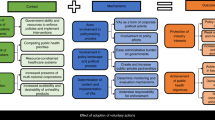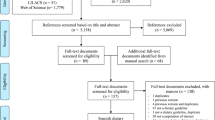Abstract
Background/Objectives:
To achieve the nutritional goals stipulated by micronutrient recommendations, greater attention must be paid to the behavioural routes to such nutritional outcomes. Coopting stakeholders and consumers into decisions regarding micronutrient recommendations is an important step towards achieving a greater link between micronutrient recommendations and behaviour. This study aims to examine the rationale and processes associated with consumer and stakeholder involvement in setting micronutrient recommendations across Europe.
Subjects/Methods:
Using the contacts established through the Eurreca network of excellence (commissioned by the European Commission), the research involved in-depth desk research of key documents and communication channels linked to the process of setting micronutrient recommendations across seven countries: the United Kingdom, Norway, Denmark, Germany, Spain, the Czech Republic and Hungary.
Results:
Stakeholder engagement is recognized by most countries as an important aspect of the process of setting micronutrient recommendations and their translation into policy, although there is notable variation in the extent to which this has been achieved across the seven countries and its effect on final decisions. Stakeholders were not involved at the outset of the process (‘framing’ of the problem) in any of the countries, and there was no evidence of consumer involvement and open public fora.
Conclusions:
Some of the key explanatory factors for diversity in the degree of involvement include historical sociopolitical context; the extent to which food and nutrition are key policy agenda; and the relative power of stakeholders in influencing food and nutrition policy.
This is a preview of subscription content, access via your institution
Access options
Subscribe to this journal
Receive 12 print issues and online access
$259.00 per year
only $21.58 per issue
Buy this article
- Purchase on Springer Link
- Instant access to full article PDF
Prices may be subject to local taxes which are calculated during checkout
Similar content being viewed by others
References
Ashwell M, Lambert JP, Alles MS, Branca F, Buccini L, Brzozowska A et al. (2008). How we will produce the evidence based EURRECA toolkit to support nutrition and food policy. Eur J Nutr 47, S2–S16.
Barnett J (2007). Making Consultations Meaningful: Putting Consultation in its Place. Project Report, DEFRA: UK.
European Commission (2000). Science, society and citizen in Europe, commission working document.
European Commission (2001). European Governance: A White Paper. COM 2001 428 final, 25 July.
European Commission (2002). Communication from the Commission: Towards a Reinforced Culture of Consultation and Dialogue—General Principles and Minimum Standards of Consultation of Interested Parties by the Commission. COM 2002 704 final, 11 December.
European Commission (2006). Green Paper: European Transparency Initiative. COM 2006 194 final, 3 May.
Fiorino D (1989). Environmental risk and democratic process: a critical review. Columbia J Envir Law 14, 501–547.
Foresight (2007). Tackling obesities: future choices—project report. 2nd edn, Government Office for Science.
German Nutrition Society (DGE), Austrian Nutrition Society (ÖGE), Swiss Society for Nutrition Research (SGE), Swiss Nutrition Association (SVE) (2000). Referenzwerte fur die Nahrstoffzufuhr/reference values for nutrient intake. 1st edn in German-Frankfurt/Main.
House of Lords Select Committee on Science and Technology (2000). Science and Society 3rd Report, HL Paper 3. HMSO: London.
Irwin A, Michael M (2003). Science, Social Theory & Public Knowledge. Open University Press: Maidenhead, UK.
Jasanoff S (2005). Judgment under Siege: the three-body problem of expert legitimacy. In: Maasen S, Weingart P (eds). Democratization of Expertise? Exploring Novel Forms of Scientific Advice in Political Decision-making. Springer: The Netherlands, Dordrecht.
Lachat C, Van Camp J, De Henauw S, Matthuys C, Larondelle Y, Remaut-de Winter A et al. (2005). A concise overview of national nutrition action plans in the European Union Member States. Pub Health Nutr 8, 266–274.
Neira M, de Onis M (2006). The Spanish strategy for nutriton, physical activity and the prevention of obesity. Brith J Nutr 96, 8–11.
Pijls L, Ashwell M, Labert J (2009). EURRECA—a network of excellence to align European micronutrient recommendations. Food Chem 113, 748–753.
Renn O (2008). Risk Governence: Coping with Uncertainty in a Complex World. Earthscan: London.
SACN (2003a). 5th Meeting of Salt Subgroup. 7 February 03, Food Standards Agency, Aviation house, 125 Kingsway, London (SACN/SaltSub/03/min01).
SACN (2003b). Summary of responses received to request for comments on salt and health draft report, 03/01/03. http://www.sacn.gov.uk/pdfs/sacn_salt_03_02.pdf.
SACN (2003c). Salt and Health. TSO: London.
SCF (2002). Statute of the Czech National Scientific Committee for Food (in Czech), Brno, 2002, available at http://www.chpr.szu.cz/vedvybor/statut/statut.htm.
SCF (2005). Opinion of the Czech National Scientific Committee for Food in a Matter: ‘Dietary Reference Values’ (in Czech), VVP: STAN/2004/3/deklas/VDD, Brno, 10.1.200, available at http://www.chpr.szu.cz/vedvybor/dokumenty/stanoviska/stan_2004_3_deklas_VDD.pdf.
Stirling A (2008). ‘Opening up’ and ‘closing down’: power, participation and pluralism in the social appraisal of technology. Sci, Technol, Human Values 33, 262–294.
Thuraisingam S, Riddell L, Cook K, Lawrence M (2009). The politics of developing reference standards for nutrient intakes: the case of Australia and New Zealand. Pub Health Nutr 12, 1531–1539.
Trübswasser U, Branca F (2009). Nutrition policy is taking shape in Europe. Pub Health Nutr 12, 295–306.
Wardman J, Lofstedt RE, Advisory Group on Risk Communications (2009). European Food Safety Authority (EFSA)—risk communication annual review. EFSA/AGRC/29MAY2009/AGENDA ITEM 7.3.
Acknowledgements
This study was carried out within the EURRECA Network of Excellence (http://www.eurreca.org), financially supported by the Commission of the European Communities, specific Research, Technology and Development (RTD) Programme Quality of Life and Management of Living Resources, within the Sixth Framework Programme, contract no. 036196. This report does not necessarily reflect the Commission's views or its future policy in this area.
Author information
Authors and Affiliations
Corresponding author
Ethics declarations
Competing interests
R Shepherd has received consulting fees from the UK Foods Standards Agency. J Ruprich has received grant support from EURRECA, EFCOVAL, PANCAKE and also has grants under negotiation with ACROPOLIS, 7FP EU. The remaining authors have declared no financial interests.
Rights and permissions
About this article
Cite this article
Timotijevic, L., Raats, M., Barnett, J. et al. From micronutrient recommendations to policy: consumer and stakeholder involvement. Eur J Clin Nutr 64 (Suppl 2), S31–S37 (2010). https://doi.org/10.1038/ejcn.2010.58
Published:
Issue Date:
DOI: https://doi.org/10.1038/ejcn.2010.58
Keywords
This article is cited by
-
Improving policy coherence for food security and nutrition in South Africa: a qualitative policy analysis
Food Security (2018)
-
Micronutrient recommendation stakeholders' beliefs on dietary guidelines: a qualitative study across six European countries/regions
European Journal of Clinical Nutrition (2011)
-
European micronutrient recommendations aligned: a general framework developed by EURRECA
European Journal of Clinical Nutrition (2010)
-
Developing micronutrient reference values: prioritization of tool development by the EURRECA Network of Excellence
European Journal of Clinical Nutrition (2010)
-
EURRECA: development of tools to improve the alignment of micronutrient recommendations
European Journal of Clinical Nutrition (2010)



